- Home
- Duncan James
JUNK and other short stories Page 5
JUNK and other short stories Read online
Page 5
The odd thing is that no sooner had they made all that fuss about me being Hugh, than they all started calling me Huggy, and even my thing on wheels is called a Huggy Buggy now. Anyway, after all this fuss, we all went back home, and the tall ones got stuck in to great plates of food and strong smelling glasses of something that didn’t look much like milk, but more like something else I’d better not mention. It smelt awful, as I know, because they kept coming over to me and breathing on me while making goo-goo noises. Some of the longhaired ones even kissed me, which I don’t like, so I started yelling. That put a stop to it, thank goodness, but they obviously didn’t like the noise, so I had a dummy shoved in my mouth. Do you know, I think that’s the biggest con I’ve come across so far. It looks like Mamma’s knobbly bit, but no matter how hard you suck, nothing comes out of it. Absolutely nothing. Even chewing on it makes no difference, and if you spit it out, they simply wipe it on the seat of their trousers and shove it back in again.
So what with one thing and another, I’ve no real idea about what’s going on, although as I said at the beginning it’s no real fun. I can’t properly make myself understood, even to Four, and I can’t get about on my own yet, although that day will come, believe me, and then watch out. They’ll soon know about it. I have a lot of old scores to settle, lots of things I want to explore, and many more things I want to do – although they would probably rather I didn’t.
Huggy, indeed.
And just you wait until I’ve got teeth.
***
5 - DEATH BY DROWNING
(Based on an original idea by Vida Goodfellow)
Charles Toogood and his wife Jo had decided to have an early holiday this year, and to do a bit of touring in the car instead of going abroad. They had motored in leisurely fashion, as much as one could on motorways, to the Lake District. Even off the motorways, the roads around the lakes were crowded, but they had managed to see what they had planned, and the hotels they had chosen had been comfortable, so they were in a relaxed mood as they eventually headed north, over Shap and across the Scottish border, towards the Stranraer to the Belfast ferry and the next leg of their tour.
They had never been to Northern Ireland before, but friends had been insisting for some time that they should pay a visit, so that’s what they were going to do. There had been a long debate about whether to fly to Belfast and hire a car when they got there, rather than take the ferry, but eventually Charles had been persuaded that it would be easier and more convenient to take their own car. He was not, however, looking forward to the crossing. He had managed to avoid the Lake steamers on Windermere and Coniston, and although he had been tempted by the thought of fishing for Arctic Char, one look at the small rowing boat was enough to make him change his mind.
The fact was that Charles Toogood wasn’t a good sailor, although he should have been.
Both his Grandfather and his uncle had served in the Royal Navy, but Charles had never shared their love of the sea. Indeed, Grandfather Toogood had served most of the war as a gunnery officer on HMS Rodney, and, if you accepted only half of what he said, you would be forgiven for thinking that he had been personally responsible for sinking the Bismarck. It was only later that Charles discovered that it was not the guns of HMS Rodney that had finally sunk the German Battleship, but her torpedoes, although Rodney’s guns had inflicted mortal damage earlier in the engagement that day.
Charles had also discovered, long ago, that the sea did not agree with him. He enjoyed watching it, especially when it was rough, but only with his feet firmly planted on the beach. He didn’t much care for swimming in it, and particularly disliked being on the water, however big the boat.
He somehow managed to survive the ‘voyage’ from Stranraer to Belfast, all of 3¼ hours, thanks largely to two powerful seasickness tablets and a day cabin where he could put his feet up.
In the end, he and Jo very much enjoyed an agreeable few days with their friends near Belfast in spite of the weather, which their friends described as ‘soft’. That meant it was raining, which it nearly always was. They were told that if you could see the Mountains of Mourne it was going to rain, and if you couldn’t, it already was. They never did see them, although they spent a good deal of time touring the lush, green, countryside with its patchwork of small fields. Their friends, however, had insisted on taking them out mackerel fishing on Strangford Lough, the very thought of which had quite terrified Charles and threatened to ruin their stay. However, it turned out to be quite fun, again, no doubt, thanks to two more powerful tablets. Charles had not been ill, and had actually caught a few fish.
The Irish Sea on their return had been different, though.
This time, tablets and a day cabin did not work. Granted, it was only a car ferry, which the operators claimed was fitted with stabilisers, but everyone knows what the Irish Sea can be like, even in May, and it had lived up to its reputation that morning. Which was why he was very glad to have made landfall at Stranraer. Charles was not feeling at all well.
Jo drove the car off the ferry, and eventually found a quiet teashop in the town where Charles sat for a bit to recover. The next part of their planned itinerary was somewhat unusual, but Charles wanted to visit the Parish Church at Inch, which was only just outside Stranraer. Not that the church itself was anything spectacular, but his Grandfather had spoken of it so often as being the final home of HMS Rodney’s ensign, that he simply had to have a look while he was in the area.
Charles had been very fond of his Grandfather, who had retired to a cottage on the Sussex coast when he left the Navy. The family had spent many happy school holidays there, playing cricket on the lawn, looking for crabs in the rock pools when the tide was out, and sometimes even fishing off the beach. Grandpa Toogood always had a yarn to tell about his adventures at sea, but was always saddened by his experience during the engagement with the Bismarck.
He had served on HMS Rodney for most of the war, and although it had been an old ship, launched from the Cammell-Laird yard at Birkenhead in 1925, it was regarded as one of the Navy’s most powerful battleships for a decade or more. It was in May 1941, while commanded by Captain Sir Frederick Dalrymple-Hamilton, that the Rodney was diverted from escorting to the troop ship Brittanic on its way to Canada, to join in the pursuit of the German battleship Bismarck. Radio silence was ordered as HMS Rodney joined up with another battleship, HMS King George V.
It was early morning when the two battleships, and the cruisers HMS Norfolk and Dorsetshire, engaged the Bismarck, which had already had its rudder machinery damaged by a torpedo the previous day. The bombardment soon knocked out Bismarck's guns, and HMS Rodney was able to close in on the Bismarck, until she was firing essentially a flat trajectory. Grandpa Toogood recalled how he could actually follow the shells to the target through his binoculars. By then, there were German sailors in the water as the Bismarck began to keel over.
The Captain wanted to break off the engagement to rescue survivors, but the Admiral refused, and ordered Rodney to continue its shelling. Eventually, recalled Grandpa Toogood, the battleship was ordered to turn for home because there were reports of U-boats in the area and because she was by then also low on fuel. Before doing so, though, she had finished off the Bismarck by firing torpedoes into both sides of the stricken German battleship. Once again, Captain Dalrymple-Hamilton was ordered to make for Rodney’s home port with all speed, and not to loiter to rescue survivors. Although HMS Rodney had picked up some of the German crew, they could only watch and listen as the deperate men shouted and waved in the water, clinging to their liferafts and bits of debris, as Rodney turned away.
It was a scene Grandpa Toogood would never forget, and the memory of it had always haunted him. With his own dread of the sea, Charles could only imagine the terror which the German sailors faced, struggling to survive in the oily, burning water, and watching a potential life-s
aving rescue ship turn away from them.
But now Charles planned to do something his Grandfather had not been able to do during his lifetime. He was going to visit the small church at Inch, where the Rodney’s ensign had finally been installed after the ship had been scrapped at Inverkeithing in 1948.
“I don’t think I ever knew why the ensign was put in the church in the first place,” said Jo.
“So far as I can tell,” replied Charles, “the captain of HMS Rodney, Fred Dalrymple-Hamilton, came from these parts, and was an elder of Inch church. By the time he retired, he was an Admiral, so he was able to rescue the ship’s ensign and its flagpole, and donate it to the church.”
“It will be fascinating to see it,” said Jo. “I just hope the church is open so we can go inside.”
“Grandpa always wanted to get up here to see it for himself, for old times’ sake, but never made it.”
“Well, now you can,” said Jo, as they turned off the main road to Newton Stewart. They turned left under the railway bridge, passed a quarry, and saw the church ahead of them.
They parked at the end of a short path which led to the grey stone building. The path was hedged with dog roses and honeysuckle, in sharp contrast to the austere and rather bleak looking church itself.
“It doesn’t look exactly warm and welcoming,” commented Jo.
They opened the heavy oak door, and stepped inside. The church smelt damp, but as their eyes adjusted to the gloom, they were able to see the ensign on its flag pole, pinioned to the wall on the left of the nave.
“It’s much bigger than I thought,” said Charles.
“It certainly looks old,” observed Jo. “The white isn’t white anymore. It needs a good clean.”
As they got closer, Jo shivvered.
“It’s cold in here, don’t you think?”
“Damp, too,” replied Charles. “And there’s quite a draught coming from somewhere, as well.”
The ensign stirred silently, and Charles felt his hair ruffle.
“I don’t think I like it in here,” said Jo. “Would you mind if I waited in the car?”
“By all means,” agreed Charles. “I shan’t be long, but I’ll just sit on the pew here, by the flag, for a few minutes if you don’t mind. Grandpa would have wanted me to.”
“I suppose he would,” Jo nodded. “It doesn’t bear thinking about what terrible scenes that ensign must have witnessed during the war.”
There was a gust of a breeze as Jo turned to walk back down the aisle, and the oak door slammed shut.
“I’ll open it,” she said. “You stay here as long as you like, but I’m going.”
The heavy ensign stirred again, and there was a faint rumbling sound, as if someone was in the organ loft, tuning up. But the church was empty apart from the Toogoods.
Jo managed to open the door, and was glad to get out into the open air again, leaving the damp and draughty church behind her. As she turned to close the door, it slammed behind her.
Charles was feeling decidedly chilly now, and turned up the collar of his jacket. As he sat at the end of the pew nearest the ensign, the flag fluttered again in what was now becoming quite a stiff breeze in the cold church. Charles could have sworn that the rumbling noise they had heard was getting louder, too. Indeed, it quite sounded like gunfire. He was beginning to feel distinctly uncomfortable, and wished he’d left with Jo, and yet, oddly, and for some unexplained reason, he wanted to stay. The damp, dank smell in the church was getting stronger, and Charles decided that it must be the salt laden sea air, blowing in from the loch. His dread of the sea returned for a moment, and he felt a wave of nausea sweep over him.
As he sat there, he became convinced that it really was the sound of gunfire he could hear, and there was definitely quite a strong wind behind the ensign, which was straining at its old flagpole. Suddenly, Charles wanted to get away from the church quickly, but was somehow he was unable to move. Now, to the ever-increasing sound of the gunfire was added the anguished cries of shipwrecked German sailors, pleading in vain for help and rescue. The noise of the gunfire and the screams of the men in the debris-strewn, oily sea grew louder and louder while the wind in the church grew ever stronger. Charles was not just feeling ill, he was petrified, and struggled in vain to get out of the pew and out of the church.
Jo was getting worried, sitting in the car on her own.
At first, she had been thankful to be away from the church, and had enjoyed admiring the view and watching the birds feeding in the hedgerow. But she had been there for twenty minutes or more. Charles had said he would only be a few minutes. She decided to fetch him.
What she saw when she entered the church, she would never forget.
Charles was lying in the nave, half out of the pew, staring eyes open and mouth agape. His hair was dishevelled and he was soaked through.
He was quite dead.
***
In England, they would have held a Coroner’s inquest, but this was Scotland. Jo wasn’t quite sure what was going on.
The police had made an extensive investigation first, but had decided that there would be no prosecution, as there was no motive and nobody to prosecute. Jo couldn’t have done it, and in any case, one of the villagers had seen her, through his binoculars, sitting in the passenger seat of the car outside the church at the relevant time. Not that he had ventured to visit the church, of course, to see at first hand if she was all right. That was the one day of the year when none of the villagers went near the place.
So the Procurator Fiscal - a sort of Crown Prosecution Service, Jo had concluded - had decided that there should be a Fatal Accident Inquiry, to be carried out by the local Sheriff. There was no jury, and there would be no verdict, but the Sheriff had not only to decide the cause of death, but also to make a ‘determination’ as to whether there were any reasonable precautions that could have been taken to avoid the death or to prevent a similar death in the future.
He had talked to Jo, who had described the reason for their visit, and he had also taken medical evidence.
That was when he decided to summon the Minister of Inch Church as well.
The Minister was distraught by the whole affair. The Ensign, he had said, was very much a part of local life. It was always pointed out to visitors, it was there on Remembrance Sunday, and even the local Sea Scouts in Stranraer had named their hut, rather pretentiously, HMS Rodney. The Minister admitted that strange things had happened in his church in the past, although nothing like this, of course. Nobody from the village would ever set foot anywhere near the church on one particular day of the year – the day, indeed, of Charles Toogood’s death.
It was May 27th - the anniversary of the sinking of the Bismarck. Usually, the church was shut on that day, but this year neither the Minister nor any of the elders had locked it.
The Minister also had to admit that the installation of the Ensign was, according to the records, quite unofficial. The General Assembly in Edinburgh had never been asked for permission to house it in the Church, and, if they had been, it was his view that permission would not have been granted. Which was why he was totally opposed to the Sheriff’s suggestion that he might consider conducting some sort of exorcism service. Edinburgh would need to be told about that.
“Anyway,” asked the Minister of the Sheriff, “what is there to exorcise?”
“Don’t ask me,” replied the frustrated Sheriff. “I know about Scottish law and I know about salmon fishing, but not much else. You are a man of the cloth and as you admit, there is something very odd about your Kirk.”
The man paused.
“The surgeon who conducted the post mortem thinks so, too,” he added.
“Do you mean that the poor Mr Toogood didn’t simply die of a heart attack?” asked the Minister.
“He didn’t ‘simply’ die at all, according to the autopsy,” replied the Sheriff. br />
“What, then?” asked the Minister.
The Sheriff shook his head in disbelief.
“There is some strange and powerful force at work in the Kirk at Inch,” replied the man.
“The Will of God works in strange ways, to be sure,” commented the Minister.
“This is not God’s hand at work, I’ll be bound,” said the Sheriff.
“I shall decide that, when you tell me the cause of the poor soul’s death,” said the Minister, tetchily.
“Try this then,” said the Sheriff. “The man’s lungs were full of oily sea water. Charles Toogood drowned.”
The Minister crossed himself, and muttered something about ‘the sins of the fathers’.
***
6 - POLES APART
“I’m going out,” he said.
“What do you mean, ‘going out’? You’ve only just got in.”
“Well, I’m going out again,” he replied.
This is it, then, she thought.
She’d been expecting it for some time, to be honest. But not just yet. Not tonight. It was still a bit of a shock, although not altogether a surprise.
“But you can’t go now,” she insisted. “Dinner’s nearly ready.”
“I’m not hungry,” he replied.
Neither was she, as it happened; suddenly, she’d lost her appetite.
“But it’s your favourite,” she pleaded. “Steak and kidney pudding.”
“I’m not hungry,” he said again.
“I made it specially.”
“Sorry.”
“If you must go out, at least have dinner first.”

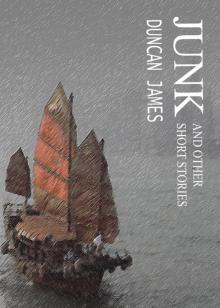 JUNK and other short stories
JUNK and other short stories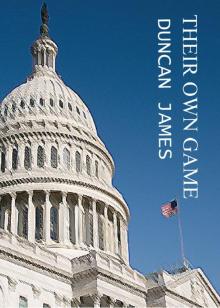 Their Own Game
Their Own Game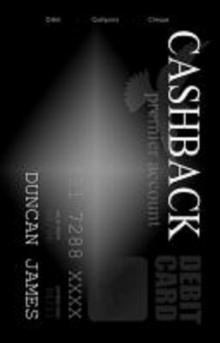 Cashback
Cashback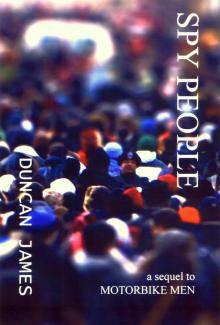 Spy People
Spy People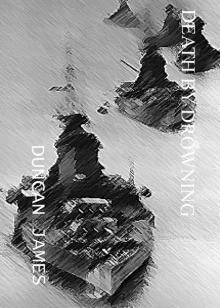 Death By Drowning
Death By Drowning Take Me Home
Take Me Home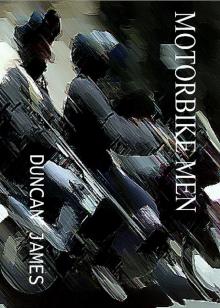 Motorbike Men
Motorbike Men